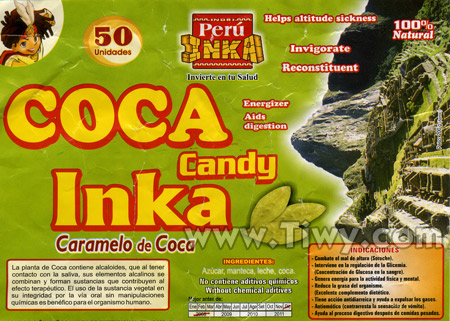UN recommends inhabitants of the Andes «not to chew coca leaves»
March 13, 2008

It's a paradox: the more they «fight» with drugs, the more drugs appear. Demand yields the supply – this is the main law of the capitalist market. Rapid «streams» of artificial hallucinogens flow into the traditional drugs river. As though the profit from this illegal business «removes» any impeding moral-ethical considerations from drug dealers. The number of drug addicts is growing, failures of special services and their advertised strategy of fighting the drug trafficking – are more evident.
In these compromising circumstances the response to the question – who is to be blamed in expansion of «traditional» drugs? - sounds as a rule stereotypically: peasants get the blame. It is peasants who grow coca, the raw material, not realising all seriousness and acuteness of the drugs problem. Exactly such was a consideration of the UN international commission on drugs control (Junta Internacional de Fiscalizacion de Estupefacientes) that is located in Vienna. The commission recommended the governments of Peru and Bolivia to «take measures to curb the deep-rooted in these countries practice of chewing coca leaves», as this habit can negatively affect the health of people. Coca leaves that serve for production of cocaine, are used by inhabitants of the Andes as a means for mountain sickness and hunger, used in teas and while performing religious ceremonies.
In Peru the appeal of the International commission to ban chewing of coca was considered as disrespect of traditions. Local politicians stated that this ritual – was a thousand year old tradition of local population that must not be legally banned. «For indigenous population of our country coca is a sacred plant, part of culture and to declare it outside the law - is disrespect to the whole nation,» said one Peruvian congressman.
In Bolivia they got even more indignant. Alfredo Rada, Minister of the government declared: «We reject the report of the UN commission. We consider its contents as biased, with the biggest slant in direction of colonialism». The minister also underlined that from the point of view of human rights the «recommendations» «not only encroach on basic principles of existence of native people (of Bolivia), but also lead to the fact that eradication of those will lead to elimination of the major portion of our cultural heritage». In a couple of days the minister was backed up by the president himself - Evo Morales, who, at the press conference, accused «recommendations» and sent the respective letter to the UN General secretary Ban Ki-moon.
In the pro-governmental circles of Bolivia they think that «recommendations» of the UN Commission were adopted with lobbying of the US representatives. Washington is displeased with excessive «self-dependency» of the Bolivians in determination of key directions in fighting the drug business, their insufficient «fervour» in reduction of coca bush plantations, by the fact that the constructive dialogue with «cocaleros» (but not methods of power) are the basis of the whole politics in such a delicate sphere. For the government of Evo Morales peasants-«cocaleros» are involuntary victims of drug business. That is why the main accent of this fight, and we should say a successful one, is put on revelation of drug dealers, drug laboratories, trafficking channels, etc.
In Bolivia and Peru the work on use of coca for «peaceful purposes» is actively carried on. Caramel with the use of coca leaves, coca-tea, toothpaste (of greenish colour, naturally) all these are the variants for use of coca. And chewing of coca leaves will continue in the Andes countries henceforward, despite all the «recommendations», «friendly advice» and even habitual socks on the jaw. Traditions are traditions. Peoples'! Millions of people in the Andes region peacefully chew coca leaves, not imposing on anyone their thousand years old customs. But one day they will get tired, that they are reproached for something they are not guilty of. And then they will set up their own competent commission that will «recommend» the industrially developed countries to properly start fighting the drug business in their own home.
A famous Venezuelan journalist Mary Pili Hernandez wrote in connection with hypocritical policy of the West to fight the drugs the following lines:
«The United States unwind the media campaign that is directed to introduce confusion in conception of «coca leaves» and «cocaine». Deliberately they hold back the fact that out of 16 chemical elements that the drug possesses, 15 are imported from the USA or Europe, and no attempts to ban or destroy these components have ever been taken...
The interest of the United States in the issue of «association» of the drug with coca leaves is connected with their political intentions on preparation for interference in the affairs of those countries, which, from the distant past, used to have that culture, under the plea of fighting the drug trafficking.